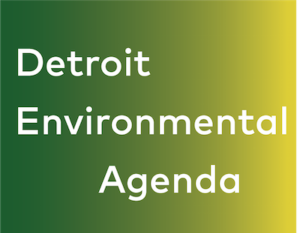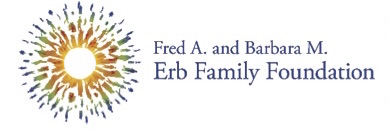The Detroit Environmental Agenda (DEA) is a Detroit-based coalition of organizations, researchers and businesses, founded in 2011, to advance environmental justice and sustainability in the City of Detroit.
The DEA has produced Voter Guides for Detroit elections since 2013. In the guides, we have presented voters with responses received from municipal candidates on a variety of environmental, community, and environmental justice matters, such as Sustainability & Equity, Climate Resilience, Air & Water Quality, Waste Diversion, as well as Land & Food Access.
Our goal is to help Detroit voters make informed decisions when they go to the polls.
Note that not every candidate has submitted responses. Responses from candidates that were eliminated in the Primary have been removed. We also provided this background information about each area before asking the questions.
The downloadable and printable PDF for the General Election: 2021 DEA General Voter’s Guide
Additional Primary Voter’s Guide Links: Press Release, Press Conference video
Candidate Responses for Detroit Mayor
Candidate Responses for Detroit City Council At-Large
Candidate Responses for Detroit City Council District 1
Candidate Responses for Detroit City Council District 2
Candidate Responses for Detroit City Council District 4
Candidate Responses for Detroit City Council District 6
Candidate Responses for Detroit City Council District 7
Background
Our candidate questionaire for this vote guide included additional background information as shown below:
Community
Communities in the City of Detroit struggle to raise their quality of life through blight removal, beautification projects, and ownership of vacant lots for repurposing. Residents are also concerned about blighted properties often owned by the Detroit Land Bank Authority (DLBA), combined with new development projects coming into their communities that lead to an increased cost of living, amongst other issues. City government is often the biggest obstacle in revitalizing communities outside of the Downtown Detroit and Midtown areas.
Moreover, while studies continue to show that more policing does not mean increased safety for many residents, the Detroit Police Department continues to be one of the City’s largest expenditures. Significantly less funding is dedicated to departments like sustainability, housing, health, and recreation.
Public Health
Increasing vehicle speeds have become a major topic across the city, as they result in more traffic crashes and make Detroit’s streets less safe for pedestrians and bicyclists. The City is responding by investing in Complete Streets (e.g. speed humps, streetscapes, bike lanes) and creating a Streets for People Plan.
Moreover, Detroiters are disproportionately affected by air quality problems stemming from increased truck traffic, heavy industry, and multiplying construction projects, and are burdened by some of the highest asthma rates in the state. The city is home to zip code 48217, the most polluted zip code in Michigan. It is therefore not surprising that Detroiters suffer from much higher rates of severe COVID cases than their more affluent counterparts.
Finally, we know that Detroiters, most of whom are renters, live in an aging poorly weatherized housing stock, with old pipes, as well as potential lead, mold and asbestos problems.
Energy
Detroiters pay some of the highest energy rates in Michigan while experiencing some of the least reliable service. Energy bills can consume up to 30% of residents’ income, which creates financial hardship that puts them at constant risk of power shutoffs.
Currently, DTE sources most of its energy from CO2 and methane-producing natural gas and coal with the city only using 1% of its rooftop solar potential. The Detroit Sustainability Action Agenda, published in 2019, set a goal of 6.6 megawatts of solar capacity by 2024.
That same year, Detroit City Council passed its first Greenhouse Gas Ordinance setting the goal of reducing its carbon emissions by 35% by 2024.
Recycling
Sustainable waste management in Detroit is critical to reducing the negative effects associated with waste disposal and litter, as well as to improving markets for recyclable and compostable materials. Currently, 35% of residents are participating in the curbside recycling program and the contamination rate was recorded at 22% in May 2019. The contamination rate will likely increase without proper education as the recycling program expands citywide. To increase waste diversion rates and materials utilization, the DEA supports the addition of a comprehensive composting program (organics recycling). Littering poses a threat to citizen quality of life and to environmental health.
Establishing sustainable waste management systems for the sake of the people, businesses, and the environment, is critical for Detroit.
Jobs
Jobs related to the environment (i.e. Green Jobs) are critical to advancing solutions to economic disparities and climate change. Detroiters trained to enter careers in construction, renewable energy, recycling, water infrastructure and conservation, air quality, and others, will play a meaningful role in championing public health and economic wellbeing in their communities. Detroit should lead in preparing residents for these jobs and in aligning existing and emerging workforce training programs with employers, who see value in hiring graduates.
Water
Detroit is a Great Lakes city and the DEA believes that water is one of our most valuable assets. Significant investments need to be made in our aging water infrastructure system in order for it to continue to serve Detroiters in a safer, more affordable and efficient way. Avenues need to be found for this infrastructure to abide by the Lead and Copper Rule and the Clean Water Act. Stormwater management also continues to be a critical issue that must be integrated into infrastructure improvements throughout the city.
Optional
Detroit residents are interested in learning more about the environmental issue(s) you are passionate about and what concrete action steps you intend to take, in order to address this issue(s).












